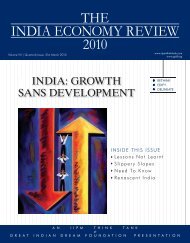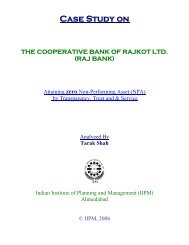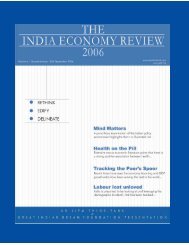[Dec 2007, Volume 4 Quarterly Issue] Pdf File size - The IIPM Think ...
[Dec 2007, Volume 4 Quarterly Issue] Pdf File size - The IIPM Think ...
[Dec 2007, Volume 4 Quarterly Issue] Pdf File size - The IIPM Think ...
You also want an ePaper? Increase the reach of your titles
YUMPU automatically turns print PDFs into web optimized ePapers that Google loves.
REIMAGINING INDIA<br />
entry tickets or toll stamps to keep account<br />
of the number of uses. But they buy<br />
it for free, and the bill is paid by the government.<br />
A useful improvement is to allow<br />
a market for these businesses, which<br />
lets an investor sell off, say a toll service,<br />
to a buyer with obligations and rights of<br />
the original contract. This facilitates entry<br />
and exit, allow firms to specialise in<br />
specific services by acquiring similar<br />
business in different places. Can we gain<br />
anything for the political system from<br />
marketisation of these services? Since<br />
these services are not individually demanded,<br />
there is no scope for bribes<br />
from individual buyers and hence no effect<br />
on the political system along the<br />
route discussed earlier. <strong>The</strong>se services<br />
however are a source of significant political<br />
corruption. Public goods are often<br />
gifted to a community before elections.<br />
Secondly when a sanctioned service gets<br />
delayed or stopped on the way it can be<br />
started or re-started only with lobbying.<br />
For urgent service local business or communities<br />
often collectively pay into party<br />
funds as part of lobbying. To stop these<br />
occurrences, of course marketisation<br />
alone is not enough. Whether a project<br />
or a service is taken up will continue to<br />
depend on the political system and hence<br />
on lobbying. But stoppage of work and<br />
allied corruption can be avoided to a<br />
large extent. Economic advantage of<br />
marketisation of these services merits<br />
separate mention. First, to match our<br />
current economic growth investment<br />
needed for infrastructure is beyond the<br />
government’s means. If the government<br />
insists on doing by itself the task will be<br />
either delayed or have to be done by borrowing.<br />
<strong>The</strong> cost of borrowing is raised<br />
from tax payers while in the suggested<br />
alternative it is substituted by toll paying<br />
users. Toll rates can be reduced as much<br />
as possible through competitive bids<br />
Pro-active services are particularly recommended for<br />
delegation to markets. While their impact on the political<br />
system could be marginal, they could help alleviate<br />
deprivation in spite of the political system<br />
from interested firms. Secondly, it is<br />
easier to assure quality of construction<br />
and subsequent maintenance under the<br />
market system. <strong>The</strong>y are to form part of<br />
the deal with the government who should<br />
enforce them strictly with penalty provisions.<br />
Because of the contractual nature<br />
of the obligation, there is no haziness<br />
about accountability when construction<br />
or maintenance is poor. This contrasts<br />
starkly with government provision, where<br />
it is nearly impossible to fi x responsibility<br />
for failure because of multiple agencies,<br />
hierarchical decisions and change<br />
of governments.<br />
Pro-active Services<br />
<strong>The</strong>se tasks are important and urgent<br />
but government organisations do a poor<br />
job. <strong>The</strong> primary reason is that assigned<br />
organisations do not have to face customers<br />
because there are no identifiable<br />
customers. Neither they nor the government<br />
or political parties are subject to<br />
any pressure for quantum, quality or<br />
speed. <strong>The</strong>se services are particularly<br />
recommended for delegation to markets.<br />
While their impact on the political<br />
system could be marginal, they could<br />
help alleviate deprivation in spite of the<br />
political system. At present markets for<br />
these services exist only in an odd, theoretical<br />
way. <strong>The</strong>re are no private buyers<br />
willing to pay. <strong>The</strong> government assumes<br />
a dual personality as both buyer and<br />
producer. It does not help because the<br />
government is only a buying agent, not<br />
a true buyer. It is expected to buy on behalf<br />
of a billion people who do not press<br />
for the services and billions more who<br />
are not even born. <strong>The</strong>re is no economic<br />
or political mechanism to keep the<br />
government interested. <strong>The</strong> result is too<br />
little production and poor quality.<br />
Whatever little is produced is produced<br />
indifferently. Inefficiency of government<br />
services is compounded here because of<br />
buyer apathy.<br />
Inviting private firms creates a group<br />
seriously interested in them--- as hotly<br />
interested as commercial firms are in<br />
their line of business. Firms specialising<br />
in these services take on the job of demand<br />
creation as part of their business<br />
agenda. <strong>The</strong>y produce media campaigns<br />
to generate public awareness of the urgency<br />
of the services and organise special<br />
interest groups that press on the<br />
political system. Some of these services<br />
40 THE <strong>IIPM</strong> THINK TANK


![[Dec 2007, Volume 4 Quarterly Issue] Pdf File size - The IIPM Think ...](https://img.yumpu.com/29766298/39/500x640/dec-2007-volume-4-quarterly-issue-pdf-file-size-the-iipm-think-.jpg)


![[Feb 2008, Volume V Annual Issue] Pdf File size - The IIPM Think Tank](https://img.yumpu.com/43961117/1/190x245/feb-2008-volume-v-annual-issue-pdf-file-size-the-iipm-think-tank.jpg?quality=85)
![[June 2008, Volume V Quarterly Issue] Pdf File size - The IIPM Think ...](https://img.yumpu.com/41693247/1/190x245/june-2008-volume-v-quarterly-issue-pdf-file-size-the-iipm-think-.jpg?quality=85)









![[Volume VI | Quarterly Issue: 31st May 2009] Pdf File size](https://img.yumpu.com/27796051/1/190x245/volume-vi-quarterly-issue-31st-may-2009-pdf-file-size.jpg?quality=85)